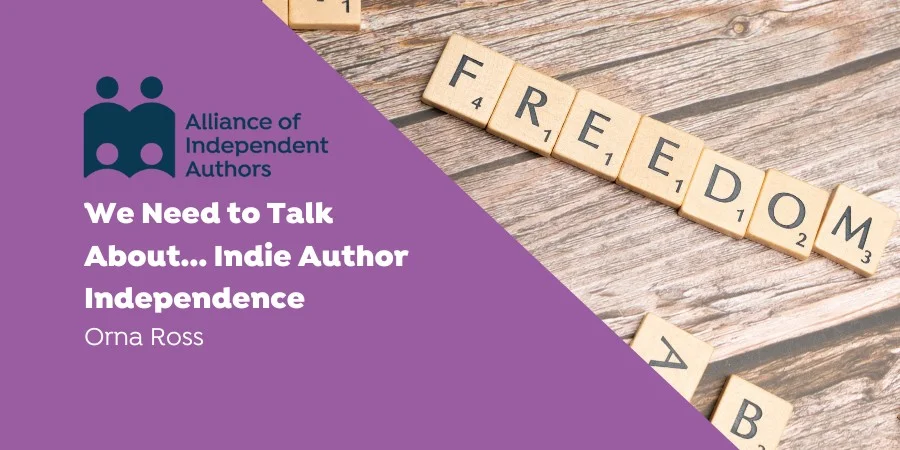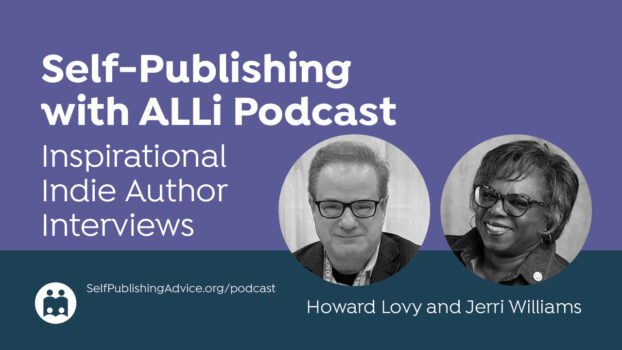
Orna Ross, ALLi Director
This week in our regular Alliance of Independent Authors opinion post, ‘We Need to Talk About…”, we're discussing what it really means to be independent as a self-published author. What motivates us to go it alone, what are the real benefits and challenges of creative control, and how could our indie author independence evolve in the future?
Read on for thoughts from ALLi Director Orna Ross and our author member community.
We Need to Talk About… Indie Author Independence
What does being indie mean to you? It's going to be a different answer for every author but too often “indie” is just used as a synonym for “self-publishing”. I'd argue it's so much more than that.
“Indie” is a shorthand for independent, but to fully embrace independence, we first have to explore what it means and then examine how we display it in our writing and publishing.
Copyright laws in most Western countries gives us automatic, exclusive, legally-secured rights to reproduce and distribute our own works. To publish, perform, or record them. To profit from them and to authorize others to also. Authors have this power, but every day at ALLi we watch authors disempower themselves by naively signing away rights, by choosing poor self-publishing services, distribution or marketing methods, or by working from assumptions about publishing that are outdated, or just plain wrong.
We all start somewhere, and we all make mistakes, but if we're not proactively taking the next step towards being more independent, we're likely reactively slipping into dependence.
Then there is the question of interdependence. The paradox of being an indie author is we develop our independence within a context of interdependence.
We all rely on services, tools and technology to do our work. From editorial to marketing, a good book that reaches its readers has had many helping hands in its making. And of course many indie authors find immense value in communities of writers, readers, and industry professionals–not to mention the support of our families and friends.
Independence is not just a business choice. It's an attitude that permeates all aspects of our work, from how we write to the ways we connect with readers.
When it's our highest value, we do well.

Photo by Darius Bashar on Unsplash
At ALLi, we spot when authors adopt an attitude of creative independence. We call it “going indie”. They begin to explore where their books fit in the marketplace and the value they're bringing to readers. They begin to set creative intentions for their marketing, to assemble a team of publishing professionals, to adopt new techniques and tools, to claim autonomy and responsibility, to accept that they are the captain of their own commercial and creative fate.
And to understand that the primary relationship, between them and their readers, is the most important one to nurture. This leads them to new technologies, tools and techniques, and to finding a personal creative routine that can fulfil their ambitions.
They move beyond thinking like a writer and start thinking like a publisher too. Soon they are up and running, on the creative ride of their life: making mistakes and enjoying successes, reaching more readers, selling more books, moving into profit.
An independent mindset develops in different ways for different authors.
To distort Shakespeare’s fine line in Twelfth Night, some authors are born independent, some choose independence, and some have independence thrust upon them.
The born indies come straight into writing and self-publishing, together. For them, it’s the obvious and only choice. Most of these are younger writers who have grown up sharing their writing on Wattpad, social media, or blogs. Publishing a book is just their logical next step. Their followers are keen for them to produce a book, follow their journey through writing and production, and buy the book as soon as it’s released. It soars to success and though it all seems to happen organically, from a publishing perspective what’s happened is that the marketing work has been done upfront.
Then there are those who consciously choose self-publishing for its creative and commercial rewards: the speed, the control, the freedom, the direct relationship with readers. With time and dedication, they also do well.
It’s those who come to self-publishing reluctantly, because they’ve repeatedly tried and failed to get a trade publisher, who have the hardest time. Most indie authors need support when starting out, as there’s a lot to learn, change and implement, but an author who is dreaming of a publishing contract from a third party is rarely in the right mind mode to do the work of becoming a good publisher themselves.
They are the ones most likely to fall away, defeated not so much by the job of self-publishing as the mindset they’ve brought to it.
What do you think?
We asked ALLi members in our selfpubconnect forum to share their thoughts on the theme of indie author independence. A wide range of views and ideas were discussed, demonstrating just how varied our experience of indie author independence can be.
Anna Sayburn Lane finds freedom in making informed decisions:
Independence becomes more of a blessing with growing experience and confidence. At first, it's the independence to make all the mistakes everyone warns you about… and learn in your own way. Eventually it's the freedom to make informed decisions, do your research using the amazing resources out there and decide on your own priorities. You get to decide what success looks like, you get to set priorities that are meaningful for you.
PJ Skinner shares the three reasons they chose to go ‘indie':
Independence, to me, means the power to make choices. As an indie, I can choose what to write, how often to publish, where to publish, in which formats without needing to refer to a third party. Being independent means owning my mistakes as well as my successes. It's about embracing accountability.
Indie publishing has made it possible for me to earn a full-time income from writing since 2018. I've never been a superstar, but my family lives modestly and, so far, it's been enough. A stroke in 2022 threw a spanner in the works, but I'm exploring how AI can help me be as productive as before in the fewer hours my fatigue allows.
Indies will be at the forefront of the inevitable changes to the industry being driven by AI and selling direct. Unlike traditional publishing, we can adapt and pivot on a dime, which is essential when the rate of change is like it is at present. These are exciting times for authors who embrace the fact that being an indie means being more than just a writer.
Karen Drury finds the choose to set your own deadlines offers the flexibility to work alongside writing:
Thoughts or further questions on this indie author independence or any self-publishing issue?
If you're an ALLi member, head over to the SelfPubConnect forum for support from our experienced community of indie authors, advisors, and our own ALLi team. Simply create an account (if you haven't already) to request to join the forum and get going.
Non-members looking for more information can search our extensive archive of blog posts and podcast episodes packed with tips and advice at ALLi's Self-Publishing Advice Centre.
Find out more:
If you aren't yet a member of ALLi, take a look at our website for all the details. Memberships range from Associates preparing your first book, right up to experienced Authorpeneurs running self-publishing and associated businesses. Each level offers benefits and support, and all members become part of the ALLi community. Find out more here: Join ALLi.
 If this post has got you thinking, take a listen to the Publishing for Profit ALLi podcast episode Independence and Interdependence with Orna Ross and Joanna Penn where they discuss why interdependence so important, and how can we be stronger together.
If this post has got you thinking, take a listen to the Publishing for Profit ALLi podcast episode Independence and Interdependence with Orna Ross and Joanna Penn where they discuss why interdependence so important, and how can we be stronger together.
And you can hear more from Orna Ross, with this recent post on the future of publishing, including a video catch-up of the London Book Fair panel session The Rise and Rise of the Indie Author with Joanna Penn, Michael La Ronn and Orna Ross discussing the rise of the indie author and what may be coming next, including the impact of AI: The Future of Publishing







Jackie Watson raises questions about indie authorship in relation to AI:
James Richardson reflects on taking control and a removal of gatekeepers:
Jamie Crawford takes pride in doing it ‘my way':
Janet Kaul reflects on the speed of indie publishing vs. the ‘approval' of traditional:
Kevin Partner finds ‘the power to make choices' most important to true indie author independence: